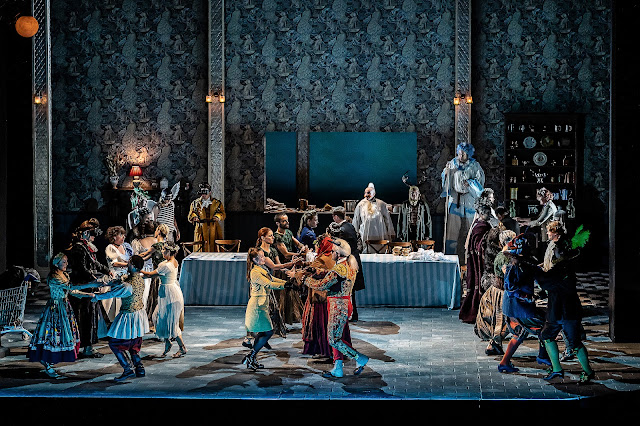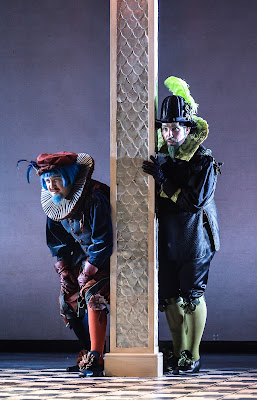 |
| David: Lalla-Roukh - Wexford Festival Opera (Photo CLIVE BARDA ArenaPAL) |
Félicien David: Lalla-Roukh; Gabrielle Philiponet, Pablo Bemsch, Ben McAteer, Niamh O'Sullivan, director: Orpha Phelan, conductor Steven White; Wexford Festival Opera at the National Opera House, Wexford
Reviewed 30 October 2022 (★★★★)
David's delightful Orientalist fantasy in an imaginative translocation with winning performances from an international cast
Wexford Festival Opera staged Félicien David's 1859 opera Herculaneum in 2016; the composer's only fully sung grand opera; his other four stage works were all written as opera comique with spoken dialogue. As part of the 2022 Magic and Music season, Wexford Festival Opera staged Félicien David's Lalla-Roukh, written in 1862 for the Opéra Comique but having a local connection as the libretto is based on the eponymous poem by Irish poet Thomas Moore, whose mother was from Wexford.
We caught a performance on 30 October 2022 in the O'Reilly Theatre at the National Opera House, Wexford. Orpha Phelan directed, Steven White conducted, designs were by Madeleine Boyd, lighting by D M Wood, choreography by Amy Share-Kissiov. Gabrielle Philiponet was Lalla-Roukh, Pablo Bemsch was Nourreddin, Ben McAteer was Baskir, Niamh O'Sullivan was Mirza, plus Emyr Wyn Jones and Thomas D Hopkinson, and Lorcan Cranitch as the narrator.
 |
| David: Lalla-Roukh - Pablo Bemsch - Wexford Festival Opera (Photo CLIVE BARDA ArenaPAL) |
The opera was sung in Michel Carré and Hippolyte Lucas' original French whilst the original dialogue was replaced by new narration in rhyming couplets by Timothy Knapman.
The opera has two main obstacles to modern performance, the quantity of spoken dialogue and the Orientalist setting (Lalla-Roukh, the daughter of the Mughal emperor, is travelling to marry the King of Bukhara). The first was solved by having actor Lorcan Cranitch as narrator.
 |
| David: Lalla-Roukh - Gabrielle Philiponet Wexford Festival Opera (Photo CLIVE BARDA ArenaPAL) |
During the substantial overture we saw customers assembling at Lalla O'Rourke's Tea Emporium. A down-and-out (Lorcan Cranitch) appeared, rooted around in the waste bin and found, amongst other things, a story book. Reading this tale, he conjures it into existence, the fantasy characters first emerging into the tea shop and then the tea shop itself disappearing. All was done with remarkable economy, just Cranitch plus six soloists, the all-singing and all-dancing chorus and seven dancers.
Crantich would intervene periodically, freezing the action and filling us in on the story. Whilst the comic elements in his narration were a bit too distancing and at times almost made fun of the characters, overall, the staging successfully managed the tricky act of creating a narrated drama that was fully engaging. It helped that the principals were all strongly drawn.
Gabrielle Philiponet made a feisty Lalla-Roukh. No coloratura canary she, instead we had some lovely love-lorn arias showing her mellow middle registers, a determined sense of getting her own way (including wielding a sword for much of the evening) and a delightful tendency to say no. In all, Philiponet made a most appealing heroine, and one who seemed remarkably modern yet completely true to David's music. And lovely to have it sung by a native French speaker (the only one in the cast, alas).
 |
| David: Lalla-Roukh - Ben McAteer, Pablo Bemsch Wexford Festival Opera (Photo CLIVE BARDA ArenaPAL) |
The two lovers had a lovely, and very substantial love scene towards the end of the first act, a moment or two when Philiponet and Bemsch really did created a sense of the air crackling between them.
As the King of Bukhara's minister Baskir, Ben McAteer trod the tricky line of creating a comic villain. McAteer's Baskir was delightfully idiotic, pompous and self-regarding, yet still held all the cards. Musically McAteer was a joy too, with lovely comic timing.
The quartet of leading characters was completed by Niamh O'Sullivan as Mirza, Lalla-Roukh's maid. Hers was delightful comic performance, her seduction of Baskir was done with a lovely knowing air and we rather regretted that O'Sullivan had only the one big aria. The cast was completed by two supernumeraries, Emyr Wyn Jones as Bakbara and Thomas D Hopkinson as Kaboul, who popped up regularly in comic fashion and made a fine comic double act.
Act One felt perhaps a trifle long, the plot told in too leisurely a manner, but the digressions were delightful including a ballet (entertainment whilst the company dined) and a danced chorus. Amy Share-Kissiov's lively choreography even managed to include a witty allusion to traditional Irish dancing.
 |
| David: Lalla-Roukh - Emyr Wyn Jones, Thomas D Hopkinson Wexford Festival Opera (Photo CLIVE BARDA ArenaPAL) |
This is sophisticated music, as I said more Chabrier than Offenbach, a lyrical comedy with lots for the orchestra to do. And they did it with great style under Steven White's deft direction.
Lalla-Roukh will only ever be an occasional piece, but Orpha Phelan's production showed that with imagination and with winning performances, the French orientalist fantasy can work in other contexts.
Never miss out on future posts by following us
The blog is free, but I'd be delighted if you were to show your appreciation by buying me a coffee.
Elsewhere on this blog
- Barbara Hannigan conducts Stravinsky & Knussen as part of a collaborative project between the Royal Academy of Music and the Juilliard School - concert review
- The Crown: American counter-tenor Randall Scotting his disc of arias written for the castrato Senesino and the research that went into creating it - interview
- Reflections on All the Ends of the World: violinist Lizzie Ball on her project with The Sixteen to highlight climate change and global warming - feature
- In search of eternal life: creating my cantata Et expecto resurrectionem, cryogenics, Burke & Hare, Frankenstein and more - feature
- Julian Phillips new piece alongside Britten and Schubert in a wonderfully imaginative programme for tenor, horn and piano at Oxford Lieder Festival - concert review
- Richly serious: mezzo-soprano Yajie Zhang and pianist Hartmut Höll in Brahms and Mahler in Oxford - concert review
- Orpheus at Opera North: greater than the sum of its parts - opera review
- Six musicians & four jugglers: introducing United Strings of Europe's Apollo Resurrected - feature
- Sarojini: Shruthi Rajasekar's new piece, premiered by Hertfordshire Chorus, merges Western classical and Carnatic musical traditions - concert review
- Persian inspirations: UK-based Iranian composer Farhad Poupel talks about drawing on rich Persian culture for his music - interview
- An evening of story-telling: soprano Masabane Cecilia Rangwanasha & pianist Simon Lepper at Wigmore Hall - concert review
- Highly persuasive: pianist Iyad Sughayer in Aram Khachaturian's Piano Concerto and Concerto-Rhapsody - record review
- Home











No comments:
Post a Comment